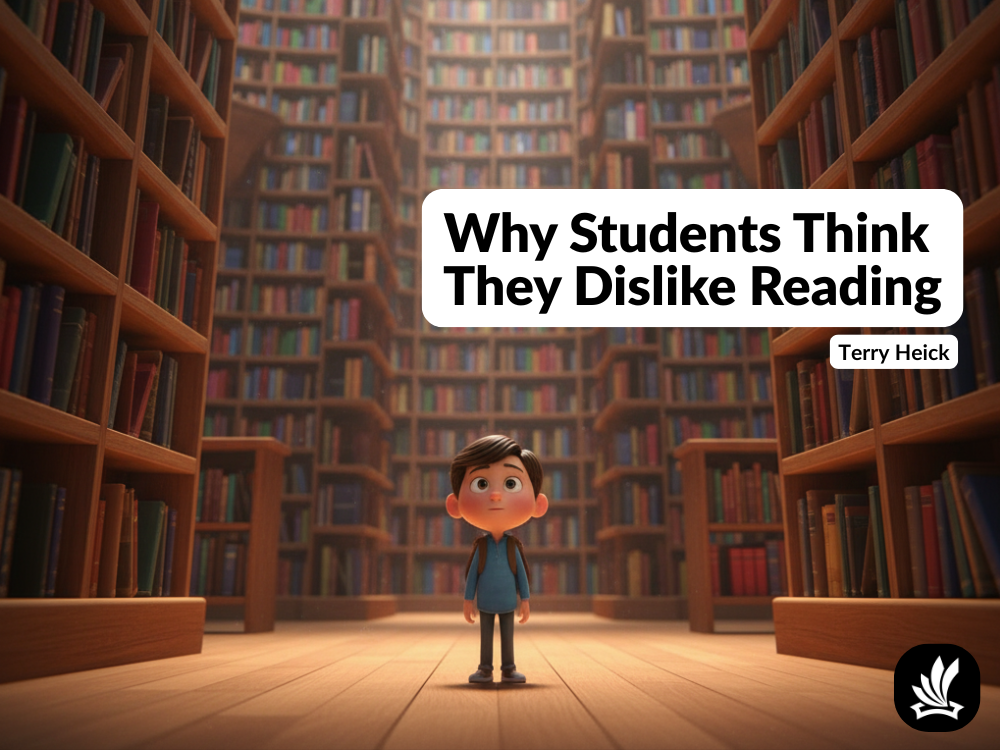

by Terry Heick
We tend to teach reading in a very industrial way.
We focus on giving kids ‘tools’ and ‘strategies’ to ‘make’ sense of a text. To ‘take the text apart’. To look for the ‘author’s purpose’—to bounce back and forth between a main idea, and the details that ‘support’ the main idea, as if the reading is some kind of thing that students happen upon by chance while on some purely academic journey.
And we push the illusion of the ‘otherness’ of a text by promoting the lie that they simply need to decode this, recognize that, and analyze that and that and that, and they’ll be able to ‘read.’
While this can work well to emphasize the work that real literacy requires, there’s little wonder why students are increasingly seeking briefer, more visual, social, and dynamic media. Because not only are these media forms effortlessly entertaining, they rarely require meaningful investment of themselves.
And it is this kind of connection that makes reading–or any other media consumption for that matter–feel alive and vibrant and whole. When readers are younger, there is a natural ‘give’ between the reader and the text, their imaginations still raw and green and alive.
But as readers grow older, there is less give–and more need for texts to be contextualized differently.
See Also: 25 Self-Guided Reading Responses for Fiction and Non-Fiction
The Spirituality Of Literacy
There is a spirituality involved in reading (really) that is challenging to promote only in the classroom. (That is, not at home, at social or recreational events, but only at school, where it will always be a kind of naked.)
Cognitively, a student ‘makes sense’ of a text through a perfectly personal schema—that is, through the symbols and patterns and enthusiasm and suffering and meaning in their own lives. Students can’t simply be encouraged to ‘bring themselves’ and their own experiences to a text; they have to realize that any grasp of the text decays almost immediately if they don’t.
Without that inward, reflective pattern where students acknowledge the sheer craziness of reading–where they are asked to merge two realities (the text, and themselves)—then that process will always be industrial. Mechanical.
A matter of literacy and ‘career readiness.’
Other.
It’s interesting that we give students mechanical tools that, even used well, can break the text beyond recognition, then wonder why they don’t appreciate Shakespeare or Berry or Faulkner or Dickinson.
We try to divorce the reader from the reading.
The nuance and complexity of literature is its magic. But students dislike reading raised in data-loud, image-based, form-full, socialized and self-important circumstances aren’t accustomed to that kind of selfless—and terrifying–interaction.
The self-reflection true literacy requires is horrifying! To closely examine who we are and what we think we know by studying another parallel examination from another human being who put their thinking in the form of a novel, short story, poem, or essay! You’re not just ‘reading’ another person’s thoughts, but you’re pouring yourself into their marrow.
No wonder they skim.
Most readers are already working from a disadvantaged position, where they view themselves as not only distinct from the text (false), but somehow further along in time and priority, as if they are being brought to some text to see if it’s worth their time.
And so they sit with it only long enough to see if it entertains them, neglecting the most fundamental tenet of literacy: Interdependence.
The Irony Of Reading
In reading, you’re simply uncovering something you’ve always been a part of. Instincts you’ve always had. Circumstances you’ve long been afraid of. Events and ideas and insights you’ve struggled to put into words but have just found right there on the page.
Your brain can’t understand it any other way.
Compared to media experiences most modern students gravitate easily towards–Instagram, facebook, Epic Fail YouTube channels, video games—reading also lacks the immediate spectacle that can catalyze the experience. Something that lights them up inside at a basic knee-jerk level, and will keep them from having to go any further.
Reading isn’t a show. (Not at first anyhow.) It doesn’t exist to make them LOL. (Though it might.) But they often turn the page hoping to be passively entertained. Ironically then, reading isn’t ‘built’ for what we use it for in education. Reading is hugely personal but in education, we often focus on the mechanics instead of the people and the strategies instead of the living and breathing happening all around us.
Reading involves process and tools and strategies, but it isn’t any of those things.
The Ecology Of Reading
It’d be easy to blame the ecology of it all. To suggest that Huckleberry Finn was only interesting because Minecraft wasn’t around to compare it to. Or to blame social media for distracting everyone.
And this is all part of it. Their habits and access to complex texts and personal affinities matter. There is an ecology that schools and students and texts and literacy operate within–an interdependence–that is there whether we choose to honor it or not. A lot of this is much bigger than you and I as teachers.
But that doesn’t excuse us from our own failures in how we teach reading in schools. We give students processes for writing and tools for reading without stopping to humanize the whole effort. Mechanized literacy has all sorts of troubling implications.
You and I–we teach students to overvalue their own opinions when they’re still often baseless and uninformed, which is like teaching them to read without helping them to truly understand why they should read.
We fail to help them navigate the blessed, intimidating, awkward otherness of reading that makes it rise.
And so we lose the reader—the real person–in the process.


2 Comments
https://shorturl.fm/1gnWI
https://shorturl.fm/x1fLf